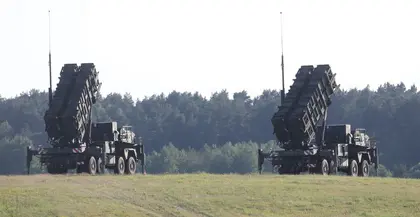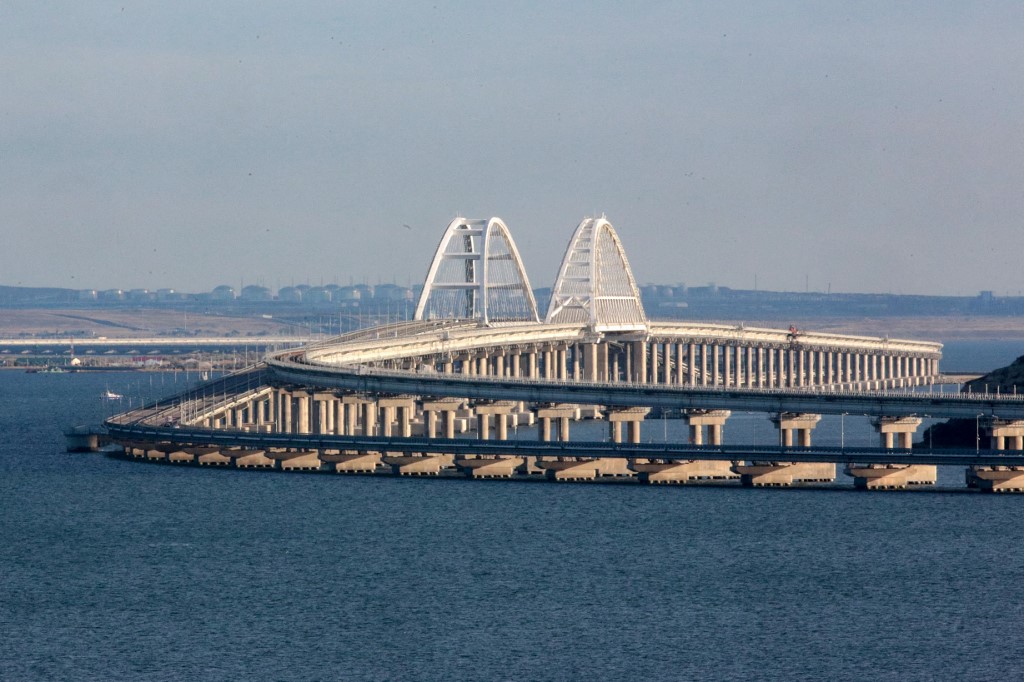Overview:
- Germany unveils package of Patriots, IRIS-Ts, Gepards and Leopards
- Defense ministers arrive at Ukraine Defense Contact Group summit
- Russia loses to Albania and Bulgaria in UN council bid
- ISW says Russia would need “more competent” troops to encircle Avdiivka
- Drones target Odesa, Mikolaiv areas, most of which were intercepted
- AFU spokesperson says Russia likely trying to conserve missiles due to sanctions
Germany rolls out new $1.1 billion military-aid package
Germany has announced a billion-dollar package in military aid for Ukraine, including more Leopard tanks and “state-of-the-art” air defense systems, AFP reported Tuesday.
JOIN US ON TELEGRAM
Follow our coverage of the war on the @Kyivpost_official.
The “winter package,” as the $1.1 billion allotment is being called, comes at a time when further American aid in the short-term has been cast in doubt because of far right Republican resistance to such expenditures in Washington, and a day after NATO’s parliament pledged longer-range missiles for Kyiv.
The new aid shipment now makes Germany the second-largest contributor to Ukraine’s counteroffensive after the United States and includes some of the defenses that Kyiv has been pleading for.
The package from Berlin includes two German-made IRIS-T medium-range missile systems and a Patriot air defense system, a longer-range weapon made by US manufacturer Raytheon, as well as 10 more Leopard tanks and three additional Gepard anti-aircraft guns. The shipment also wraps in extra ammunition, radar equipment and vehicles, as well as an estimated 60 guided missiles.
“With this new ‘winter package,’ we are further enhancing the readiness of the Ukrainian armed forces in the coming months," German Defense Minister Boris Pistorius said in a statement. Training for the missile systems, he added, will be done in Ukraine in the coming weeks.
“As winter approaches, this is exactly the support we need, and the one we discussed with (Chancellor Olaf Scholz) in Granada,” President Volodymyr Zelensky said.

Zelensky: November-December Sees Record Russian Losses in Combat
US defense leaders arrive at UDCG with global counterparts
US Secretary of Defense Lloyd Austin and newly sworn-in Chairman of the Joint Chiefs of Staff, Gen. Charles Brown, arrived in Brussels on Tuesday as the meetings of the Ukraine Defense Contact Group (UDCG) meetings kicked off, and as US promises to Ukraine are on shaky ground.
Gen. Brown assumed office on Oct. 1, replacing outgoing chairman, Gen. Mark Milley.
“The Secretary and Chairman will join ministers of defense and senior military officials from nearly 50 nations to discuss the ongoing crisis in Ukraine and the continued support from the international community to provide the Ukrainian people with the means necessary to defend their sovereign territory,” a release from the US Department of Defense stated.
The talks come at a time when US aid to Ukraine has been hampered by chaos in Congress and the American public’s attention has been redirected to the exploding Israeli-Palestinian conflict.
Wheels down in Brussels. I look forward to productive meetings at the UDCG and with my @NATO counterparts as we work together to support 🇺🇦 Ukraine’s fight to defend its sovereignty and to bolster our collective security as a NATO alliance. pic.twitter.com/LQ5nvWoGHv
— Secretary of Defense Lloyd J. Austin III (@SecDef) October 10, 2023
Russia loses bid for seat on UN Human Rights Council
“UN member states sent a strong signal to Russia’s leadership that a government responsible for countless war crimes and crimes against humanity doesn’t belong there,” said Louis Charbonneau, United Nations director at Human Rights Watch, on Tuesday.
About a year after its invasion of Ukraine, Russia lost its seat on the UN Human Rights Council, a seat it tried to get back in a vote to add two seats to the body. Those seats went instead to Bulgaria (160 votes) and Albania (123 votes), while Russia managed just 83 votes in the secret ballot.
Operations: Donetsk and western Zaporizhzhia regions
Hours after they first launched localized offensive operations in the Avdiivka area, Russian forces have intensified offensive operations northwest of the stronghold near Ocheretyne, Tonenke, and Berdychi, and southwest of Avdiivka on the Vodyane-Opytne line in an attempt to encircle the city.
Avdiivka is a significant symbol to the defense forces as it has been a Ukrainian partisan stronghold ever since Russia annexed and fortified defenses of the nearby regional capital city of Donetsk.
Analysts from the Institute for the Study of War (ISW), however, proposed that it would require more capable manpower than the Russians currently have to achieve that goal:
“Russian forces have conducted grinding offensive operations for relatively minimal territorial gains near Avdiivka for the past year and a half of the war, and the Russian military command is likely aware that an effort to capture Avdiivka would require more and higher-quality units than those currently deployed in the area,” the ISW analysts wrote.
“A successful encirclement of Avdiivka, one of the most heavily fortified areas of the Donetsk Oblast front line, would very likely require more forces than Russia has currently dedicated to the Avdiivka-Donetsk City effort.
“Russian forces have largely deployed irregular forces along this frontline, primarily elements of the 1st Donetsk People’s Republic (DNR) Army Corps and additional volunteer formations that have largely suffered from poor and abusive command culture and tensions with regular Russian units.”
AFU downs 27 of 36 Shahed drones headed for Odesa area
The Armed Forces of Ukraine (AFU) reported Tuesday that air defense forces downed 27 of 36 Iranian-made attack drones targeting the Odesa, Mykolaiv and Kherson regions, likely launched from Crimea.
The Odesa Region’s governor, Oleh Kiper, said unspecified “logistics infrastructure” there had been damaged but that no injuries were reported, according to The Independent.
The ISW pointed out that Ukrainian Southern Operational Command Spokesperson Captain First Rank Natalia Humeniuk said on Tuesday that Russian forces are “likely conducting strikes using only Shahed drones because the Russian military is attempting to conserve missiles since production has slowed due to sanctions.”
Defenders of the sky destroy russian attack drones over Odesa and Mykolaiv regions.
— Defense of Ukraine (@DefenceU) October 10, 2023
Tonight, Ukrainian Air Forces destroyed 27/36 «Shahed-131/136». pic.twitter.com/4GO3tP23ho
You can also highlight the text and press Ctrl + Enter









